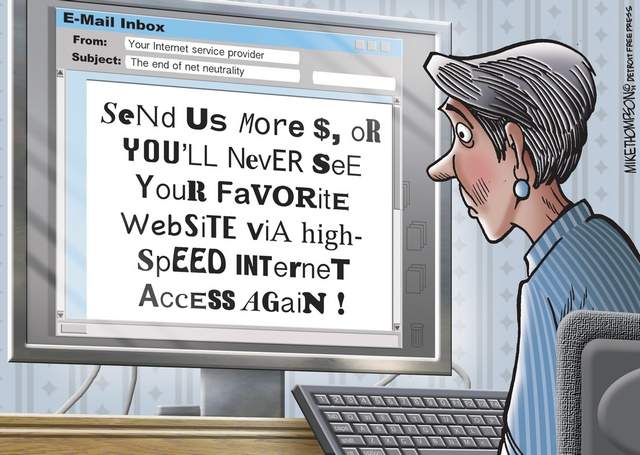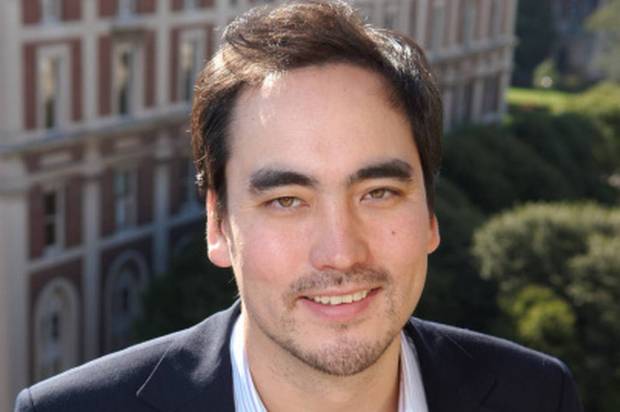
Next week on September 9th, New York voters will go to the polls to vote in the Democratic primary for the state’s gubernatorial races. Governor Andrew Cuomo will be running in his first re-election campaign after his successful 2010 bid for the state’s top spot which saw him running uncontested in the Democratic primary and trouncing Republican Carl Paladino in the general.
While there’s almost no doubt that Cuomo will be returning to the governor’s office this year, this year’s gubernatorial race in New York has still been one to watch: namely in regards to who will be standing alongside Cuomo this November. Cuomo’s running mate is Kathy Hochul, a former U.S. Congressman; before her term in the House, Hochul also served as Erie County Clerk for four years. After being defeated in her 2013 re-election campaign, Hochul joined the private sector working as a lobbyist for New York-based M&T Bank.
Hochul has been a lacklustre candidate for lieutenant governor, and virtually unknown outside of Buffalo political circles. Meanwhile, she’s had to spend most of the summer fighting against her own political past: in 2006, Hochul loudly advocated in favour of turning people suspected of undocumented status to federal authorities. Hochul has also voted several times against Obamacare and against gun control. Today, Hochul says she has reversed her position on undocumented immigration (2006 was a different time and place, she tells to Karen DeWitt of Norty County Public Radio) and now claims to be “1000%” in favour of DREAMers. Yet, these statements remain like an albatross around Hochul’s neck.
Meanwhile, another candidate — Columbia law professor Timothy Wu — has become the sudden rockstar of the New York state lieutenant governor’s race; and, if Wu is able to defeat Hochul next week and all other opponents in the general, he will become the first Asian American to hold statewide office in New York State.
So, who exactly is Tim Wu?
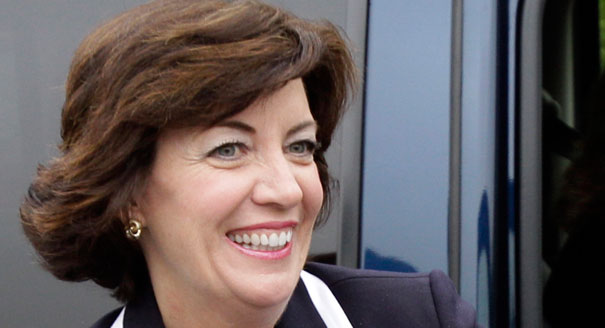
Tim Wu, running-mate to independent candidate Zephyr Teachout, is perhaps best known as the man who coined the phrase “net neutrality”. A staunch advocate of a free internet (see my recent post on why net neutrality is a civil right), Wu is campaigning predominantly on his net neutrality credentials by trying to make the proposed Comcast-Time Warner Cable merger a significant campaign issue. Wu has advanced a legal argument based on tenets of federalism to assert that New York state could put a halt to the proposed $45 billion merger — a deal that will put one-third of all broadband markets under the purvue of a single company, which runs the risk of hurting consumers — between two of the country’s largest cable companies: Wu argues that because Time-Warner is based in New York, state regulators could block the merger without federal intervention. (Wu is also critical of the Obama administration for failing to take a strong stance against the proposed deal, as well as what he terms a “timid” stance on net neutrality overall).
To hammer these points home, Wu has built his entire platform around aspects of the net neutrality debate. He cites on his website that his platform is:
- Radical shakeup of Albany Corruption
- Immigration policies that attract the best and the brightest to New York
- Open internet and increased broadband deployment
- Protection for small businesses
- New approaches to upstate economic development
- Scrutiny of big business and uncompetitive utilities
- Enforcement of the antitrust laws
At least five of seven of these points are relevant to the Comcast-Time Warner merger. Wu further advances a separate “digital platform”, which more obviously tackles internet-related issues and which further underscore Wu’s advocacy in favour of a free, democratic internet.
That Wu would is trying to — and is largely succeeding in — making net neutrality a strong campaign issue is perhaps not too surprising: this is the issue that Wu is known for, and all conventional political wisdom demands that Wu focus the campaign conversation on this topic. Wu has no experience in elected office — he cites his time serving as a higher-level technology advisor for the 2008 Obama campaign and for the FTC — but is well-known in net neutrality circles for his strong writing on the subject; this can be the only experience to present to the voting public.
Perhaps more interesting (at least for political wonks) is Wu’s other platform point: Wu is proposing to reinvigorate the lieutenant governor’s position in New York state if he takes office in November. In a lengthy White Paper, Wu discusses the legal and political basis for re-envisioning the role of the Lt. Governor. He writes:
The office of Lieutenant Governor in New York State has sometimes served a useful role but also has a history of wasted potential. A constitutional office with its own budget and powers1, including the Presidency of the Senate, the office has too often merely served a ceremonial and symbolic role. Even among the well-qualified individuals who have been nominated separately from the Governor in the primary, officeholders have often acted as little more than a ceremonial adjunct of the Governor.
This White Paper presents a different vision for the Office of the Lieutenant Governor. It describes how it might be reinvented and re-envisioned for the present needs of New York State.
First, this White Paper proposes that the Lieutenant Governor more fully inhabit the legislative role of President of the Senate. As both the presiding officer and the tie-breaking vote, the Lieutenant Governor has a built-in legislative capacity, and shares this feature with Lieutenant Governors of other states like Texas and Vermont.
But more generally, as Senate President, the Lieutenant Governor ought present him or herself as an independent policy voice, combining both research and policy entrepreneurship in a single role.
As if redefining the conversation as well as the office he seeks weren’t enough, Wu is running a highly non-conventional campaign. Perhaps drawing from Obama’s success in 2008 and/or his own natural constituency of those who might be most passionate about net neutrality issues (connected young people), Wu is running a campaign that could only be described as hipster post-Millennial. Wu’s digital presence is a crisp, clean, and minimalist WordPress-powered blog. Social media feeds figure prominently, whereas (until September 2) it was substantially easier to discover that Wu likes his water without ice (“stay lukewarm”, he tells his readers) and that his favourite fruit is the durian, than to find his policy proscriptions.
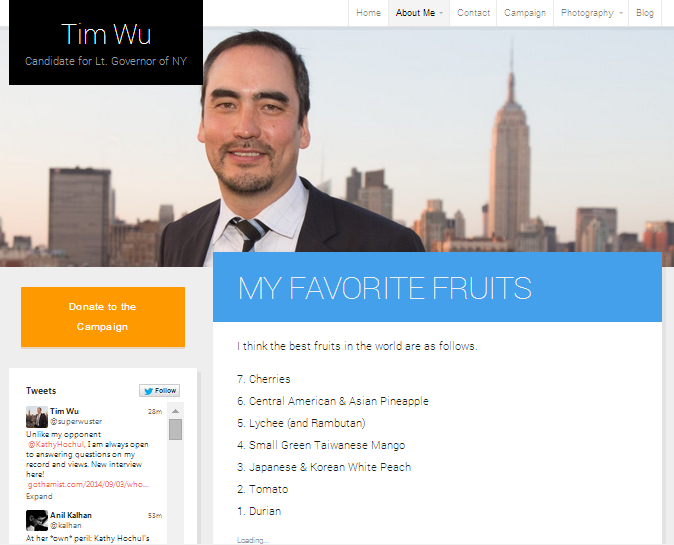
Wu offers no dry discussions about his thoughts on state or national issues anywhere on his website. Other than his aforementioned White Paper — which is a phenomenal read — Wu seems to expect his voter to be engaged with his campaign, and to learn about his candidacy through media coverage. For a candidate whose campaign is all about the power of the internet to provide frictionless information from multiple sources, this unconventional tactic approaches the workings of a mad genius.
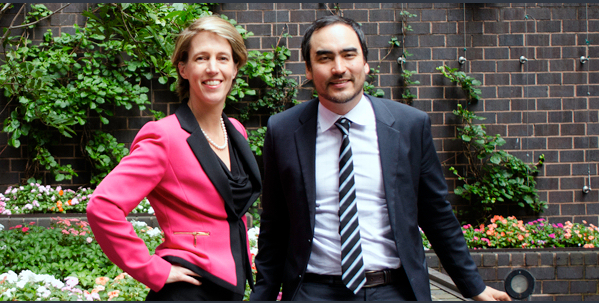
It all seems to be working for Wu. Whereas Hochul’s campaign has simply failed to excite (in large part due to her track record as a blue-dog Democrat), Wu’s campaign has stolen all the buzz in the New York Democratic primary. Wu won several key endorsements (which he refuses to list on his webpage, making the life of this blogger more difficult) including a surprise endorsement by The New York Times, which cited his “fresh perspective” and “impressive record in the legal field”.
Among Asian American New Yorkers, it’s hard to predict what will happen. New York is 8.3% Asian American, with most of the population living in New York City and surrounding burroughs. Although Hochul secured several key endorsements from Asian American politicians early in the race — including U.S. House representative Grace Meng, Councilwoman Margaret Chin, Assemblyman Ron Kim, Councilman Peter Koo and a few Asian American business associations — Wu has been making significant inroads with Asian American voters. Wu has hit the campaign trail this week to talk about his father, a prominent political activist for Taiwanese independence, and has been interacting with Chinatown voters in fluent Mandarin.
“The response has been great,” he said during a lunch recently in Flushing, as he feasted on stinky tofu, jellyfish and sliced pork with garlic sauce. “People are telling me, ‘We’ve got to support our blood.’ ”
During a recent lunchtime visit to the Taiwan Center, a magnet for older adults, Mr. Wu introduced himself as a Columbia professor, encouraged people to vote on Sept. 9, and noted that his late father was a native of Tainan, in southern Taiwan.
He stressed that immigrants needed to be treated with respect, and that small businesses needed to function in a welcoming environment. Then he played Ping-Pong. “Ai you!” Mr. Wu blurted in Mandarin a few times, expressing his disappointment after committing an unforced error.
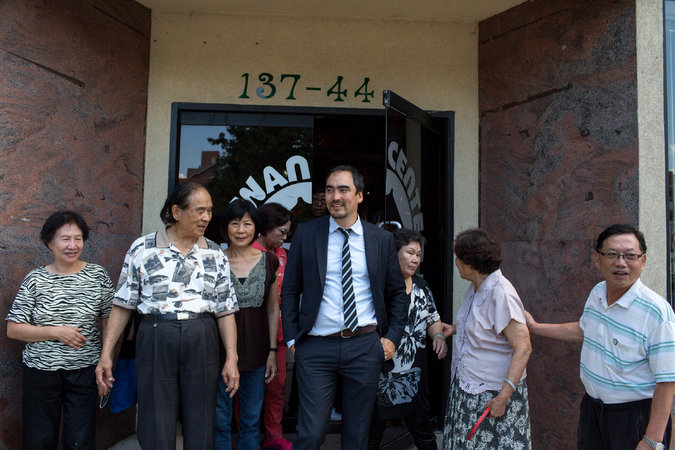
Although Teachout is not expected to beat out Cuomo, the lieutenant governor’s race is voted on separately from the governor’s race, and some are thinking that Wu might make an unexpectedly strong showing, or even fully outcompete Hochul. The New York Post is even reporting that if Wu doesn’t take the nomination outright, Cuomo’s camp is contemplating switching out Hochul for Wu should the Teachout/Wu ticket be able to claim more than 30% of votes in next week’s primary, a target that analysts are saying is very possible.
All of that boils down to this: there’s a very strong chance that New York state’s first Asian American to hold statewide elected office will be a progressive Columbia law professor who has made it his mission to protect digital rights from corporate greed, and who likes his water lukewarm.
As a fellow progressive, there’s a lot about Timothy Wu’s candidacy that appeals. As I’ve written, a free internet should be considered a civil right and I support any candidate who would make net neutrality and other anti-trust principles a statewide priority. Although I generally dislike single-issue candidates, I also think persistent tolerance of right-of-center Democrats have significantly damaged the Democratic Party, and I cannot fathom supporting another pro-gun, anti-immigrant, and anti-ACA leftist-in-name-only. But if there is one thing that excites me above anything else about Tim Wu’s candidacy, it is his radical ideas about the lieutenant governor’s office. Like Wu, I prefer politicians who are intentional about the office they hold.
So beyond net neutrality; beyond anti-trust; beyond immigration rights; beyond simply electing the first Asian American to the lieutenant governor’s position in New York state; if we can elect a man who would revolutionize the role of the Lt. Governor by restoring power to it, that might itself be a legacy worth establishing.
If you are a registered Democratic voter in New York, please remember to vote in the New York Democratic primary on September 9th. Please visit this website for more information on next week’s primary (factsheets available in multiple languages including Chinese, Korean and Bengali), and remember to know your voter rights.
